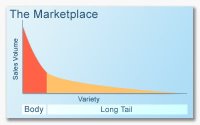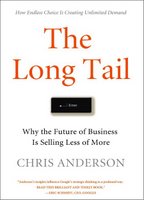« Home | Radio Was In The News This Week »
Maybe the long tail isn't wagging the dog after all
 For the last 2 years, Wired magazine writer Chris Anderson's online theories regarding "The Long Tail" have gotten a lot of attention. It got the Wall Street Journal's attention yesterday, taking a bite out of the long tail supposedly wagging the internet's ecommerce dog. And onliners have taken notice.
For the last 2 years, Wired magazine writer Chris Anderson's online theories regarding "The Long Tail" have gotten a lot of attention. It got the Wall Street Journal's attention yesterday, taking a bite out of the long tail supposedly wagging the internet's ecommerce dog. And onliners have taken notice.
Essentially, the long tail refers to a relative handful of blogs or sites that have a dominant amount of links going into them (the power few), giving them more market share and stronger ability to generate sales, while stretching down "the long tail" of millions of other smaller blogs sites may have only a handful of links going into them (i.e. the rest of us), giving them less influence in the marketplace of products and ideas.
However, they can still possess power, as Anderson has explained in a series of speeches and blog posts since his original article and has further extended the concept with his new book "The Long Tail: Why the Future of Business is Selling Less of More". In the book, Anderson argues that products that are in low demand or have low sales volume can collectively make up a market share that rivals or exceeds the relatively few current bestsellers and blockbusters, if the store or distribution channel is large enough. In addition, he also talks about the downfall of the mass media concept of a "hit", amonth other subjects as they relate to the impact of the long tail.
In the book, Anderson argues that products that are in low demand or have low sales volume can collectively make up a market share that rivals or exceeds the relatively few current bestsellers and blockbusters, if the store or distribution channel is large enough. In addition, he also talks about the downfall of the mass media concept of a "hit", amonth other subjects as they relate to the impact of the long tail.
It seems to be among the most-talked-about books on internet commerce and marketing, giving a point-of-view showing how the Web is changing things. But yesterday Wall Street Journal columnist Lee Gomes disagreed with much of the tail argument, saying "it may be a long time before the long tail is wagging the web". This got the blogs a-talking.
In fact, Anderson write about the WSJ backlash here. Referencing the book, Anderson's argument is that traditional companies are limited by retail space -- only the "hot" items sell, so several thousand others, with a smaller demand, fall by the wayside. On the Web, companies like Amazon can carry a bigger inventory of slower-selling items. Anderson calls these "misses"; they make up the "long tail" of the title and add up to a big number. The new long tail idea is that this number could be even bigger than the combined sale of hot or "hit" items.
Referencing the book, Anderson's argument is that traditional companies are limited by retail space -- only the "hot" items sell, so several thousand others, with a smaller demand, fall by the wayside. On the Web, companies like Amazon can carry a bigger inventory of slower-selling items. Anderson calls these "misses"; they make up the "long tail" of the title and add up to a big number. The new long tail idea is that this number could be even bigger than the combined sale of hot or "hit" items.
One of his principles, the "98 Percent Rule," claims that no matter how much inventory you put online, somebody will buy it. That rule doesn't hold up when you consider online stores, WSJ's Gomes counters. Real Networks' music service shows that 22 percent of its music catalog receives a quarterly no-play rate; another 19 percent, just one or two plays. Nearly half of Rhapsody's available music is almost NEVER played! If you consider Amazon.com, the Web's largest retailer, 75 percent of its revenues come from only 2.7 percent of its titles. That's far more than the 25 percent that comes from its massive "long tail" inventory. So much for the long tail amounting to more than the combined sale of "hit" items.
If you consider Amazon.com, the Web's largest retailer, 75 percent of its revenues come from only 2.7 percent of its titles. That's far more than the 25 percent that comes from its massive "long tail" inventory. So much for the long tail amounting to more than the combined sale of "hit" items.
Adds Joint Communications' CEO John Parikhal:"Part of the Long Tail 'concept' is valid -- more choices are made available to more people over a longer period of time and "search" helps makes it possible.
The 'economics' of the Long Tail are ahead of their time (he's about 10-15 years ahead of some of the changes he predicts AND they will never account for the percent of revenue he thinks they will).
Most consumer goods are not really 'necessary' and therefore 'newness' will always account for a disproportionate share of many products. And, if something really breaks through and gets a big share of the pie, competitors will attack with improvements, limiting the demand and pricing the 'old' product (that was once 'new') can get on the long tail.
I think Chris Anderson is going to take a beating over this and it is going to hurt enthusiasm for the idea.
Having said all this, the idea of the Long Tail is an important way of thinking about distribution, inventory, niches and pricing."
Certainly puts new questions out there regarding how much the tail is waging the online dog players out there.
posted by Unknown @ Thursday, July 27, 2006,
![]()
![]()















